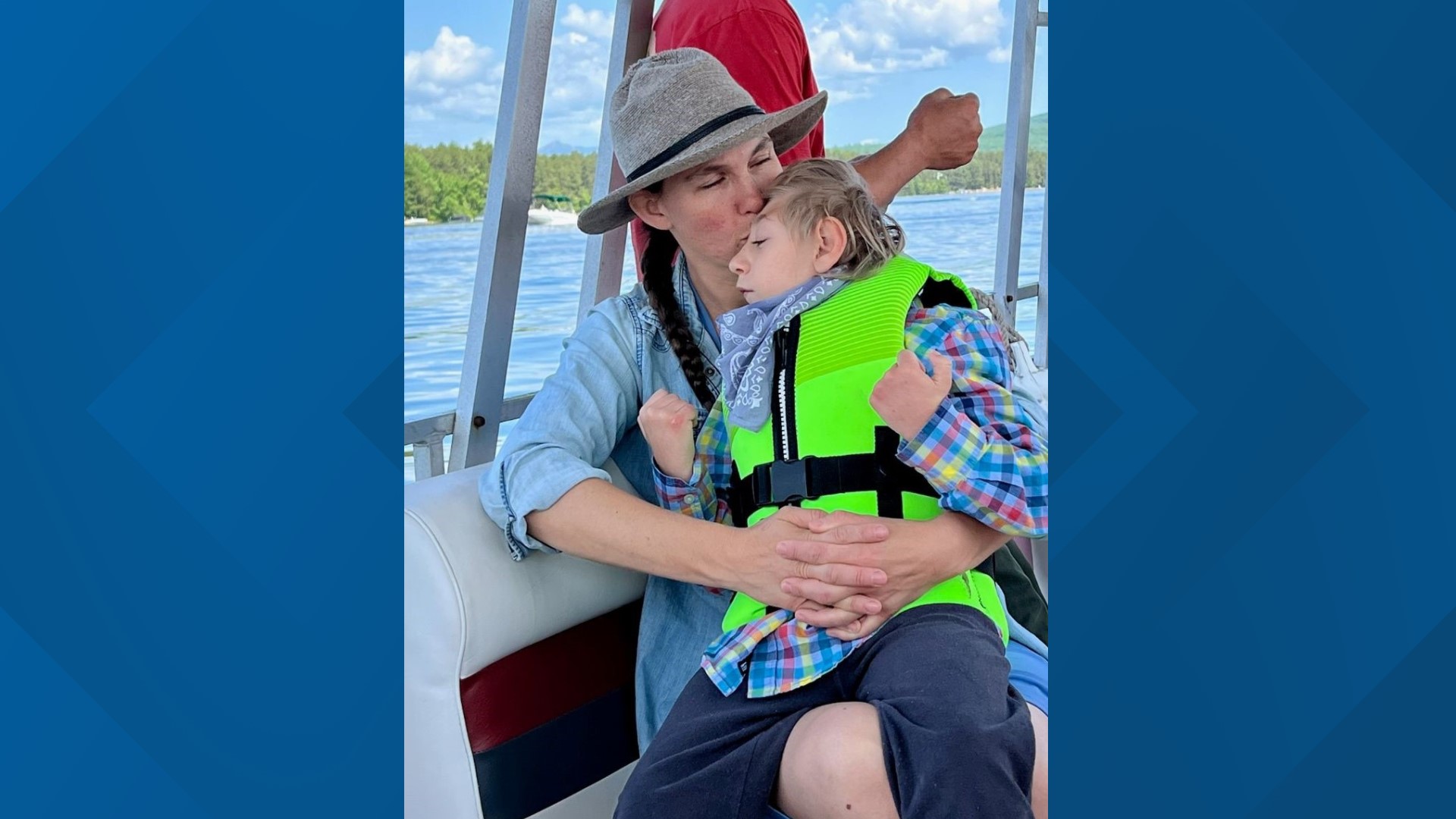MAINE, USA — The workforce crisis in Maine is taking a toll on families of children with the highest medical needs, who often step in to provide around-the-clock care themselves.
LD 346, which is awaiting a vote in both the Maine House and Senate, would pay parents to be their kids' caregivers.
Two bills sponsored by Rep. Jessica Fay, D-Raymond, and Sen. Joseph Baldacci, D-Bangor, considered by lawmakers this session, proposed extending MaineCare coverage to parent caregivers of sick children. Fay's bill, LD 346, was voted unanimously out of the Legislature's health and human services committee.
In April, we introduced you to 7-year-old James Dole, his 5-year-old brother Rafe, and his mom, Andrea Dole, of Belfast.
James, who loves to swing, needs constant medical care and therapy. Born with microcephaly and cerebral palsy, he is also nonverbal and has a feeding tube.
The youngster has a nurse, Richard, who is by his side at school, but it's not enough to cover the hours of care he needs and qualifies for. Over the past five years, 17 nurses have left for better-paying jobs.
With most of her son's care solely on her shoulders, Andrea, a social worker, is unable to work. Under Maine Care rules, the state's version of Medicaid, she also can't get paid to be James' caregiver, but that could change under a proposed bill.
"That would be such a huge relief if that compensation would be coming in," Andrea said.
The bill would extend MaineCare coverage to parent caregivers under Section 40, which covers home health services.
Nancy Cronin is the executive director of the Maine Developmental Disabilities Council.
Parents would have to apply to work through a home health care agency because you need a fiscal intermediary, which is a good thing, Cronin explained. Unlike children with behavioral health care needs, Cronin said there is currently no centralized referral system within Maine's Department of Health and Human Services where case managers can work with families of medically fragile kids, which could number more than 100 across the state, to find professional medical help.
The proposal, which still faces votes in both houses of the Legislature in the next few weeks, will require DHHS rulemaking and a state plan amendment. If approved, the program could be in place in July of next year.
"After working on this policy for three sessions, I am glad that we have found a path forward. Parents of children who qualify for MaineCare because of a disability are often seriously impacted financially due to a lack of available care. Once implemented, LD 346 will provide some relief for parents who have had to leave the workforce to care for disabled children," Fay told NEWS CENTER Maine in a statement.
"It's going to be less of a burden for the taxpayers, and the home health industry will be getting more very skilled workers, so it feels like a win-win for everyone with children coming out on top," Andrea explained.
James was recently hospitalized with pneumonia, but was able to recover and competed in the Special Olympics last month, with his family and community cheering him on.
"He was taking all the steps with the support of the gait trainer, and it was a blistering hot day," Andrea explained.
Andrea believes compensation is critical to help parents and their children survive emotionally and financially.
"The choice is, 'Do I earn an income, or do I keep my child alive,'" Andrea said passionately.
The Home Care Alliance of Maine, which represents home health care providers across the state, supports the bill. If passed, providers would support parents with training and oversight.
Laurie Belden, executive director of the agency, told NEWS CENTER Maine the following in a statement"
"Caring for Mainers in the home is essential to relieving the stress on facilities by keeping patients of all ages out of hospitals and long-term care settings. Yet, the home care industry is faced with the same workforce shortage crisis as other sectors in the healthcare industry - not enough caregivers (direct care workers or licensed professionals) to care for the Mainers who choose to receive their care in their homes and community.
"The Home Care Alliance of Maine supports LD 346 as it implements a pathway for a parent of a MaineCare-eligible child to be a paid caregiver employed by a home health care provider. A home health care provider can provide valuable tools, training, and oversight so the parent has the necessary support to best meet the complex medical needs of their child while keeping them in the safety (and familiarity) of their home and community. We applaud Rep. Fay for her commitment to affordable, accessible quality care in the home and community. We look forward to working with the Department as the rules for this policy are developed."
For more information about paid family caregiving for children with complex medical needs and disabilities, click here.

